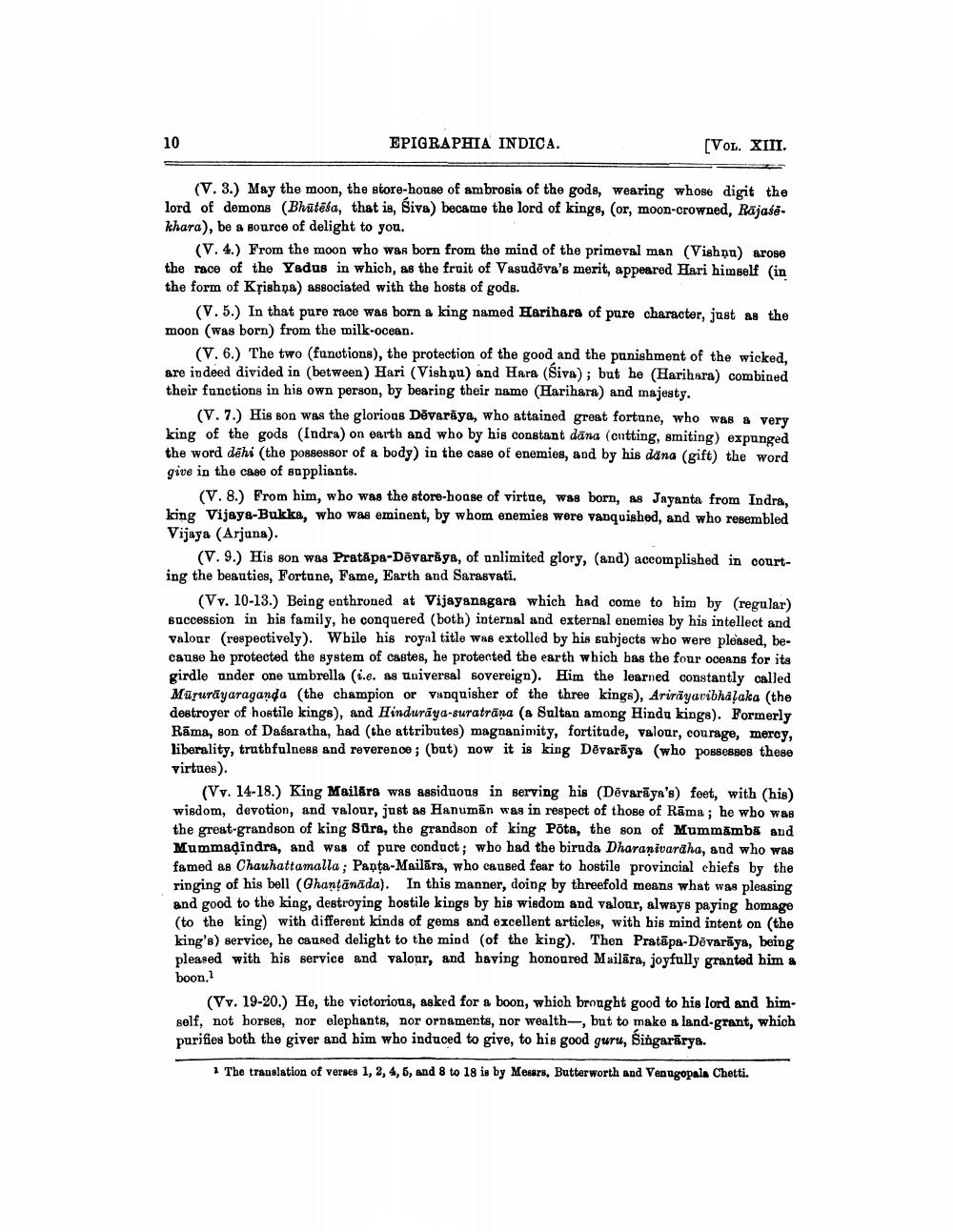________________
EPIGRAPHIA INDICA.
(VOL. XIII.
(V. 3.) May the moon, the store-house of ambrosis of the gods, wearing whose digit the lord of demons (Bhūtēka, that is, Siva) became the lord of kings, (or, moon-crowned, Rajasa. khara), be a source of delight to you.
(V. 4.) From the moon who was born from the mind of the primeval man (Vishnu) arose the race of the Yadus in which, as the fruit of Vasudeva's merit, appeared Hari himself in the form of Kțishna) associated with the hosts of gods.
(V.5.) In that pure race was born a king named Harihara of pure character, just as the moon (was born) from the milk-ocean.
(V. 6.) The two (functions), the protection of the good and the punishment of the wicked, are indeed divided in (between) Hari (Vishnu) and Hara (Siva); but he (Harihara) combined their functions in his own person, by bearing their name (Harihara) and majesty.
(V. 7.) His son was the glorious Dāvarāya, who attained great fortune, who was a very king of the gods (Indra) on earth and who by his constant däna (ontting, smiting) expunged the word dēhi (the possessor of a body) in the case of enemies, and by his dana (gift) the word give in the case of suppliants.
(V. 8.) From him, who was the store-hoase of virtue, was born, as Jayanta from Indra, king Vijaya-Bukka, who was eminent, by whom enemies were vanquished, and who resembled Vijaya (Arjuna).
(V. 9.) His son was Pratapa-Dövarðya, of unlimited glory, (and) accomplished in courting the beauties, Fortune, Fame, Earth and Sarasvati.
(Vy. 10-13.) Being enthroned at Vijayanagars which had come to him by (regular) Buccession in his family, he conquered (both) internal and external enemies by his intellect and valour (respectively). While his royal title was extolled by his subjects who were pleased, because he protected the system of castes, he protected the earth which has the four oceans for its girdle ander one umbrella (1.e. astuiversal sovereign). Him the learned constantly called Mururāyaraganda (the champion or vanquisher of the three kings), Arirāyaribhālaka (the destroyer of hostile kings), and Hinduraya-suratrāna (a Sultan among Hindu kings). Formerly Rāma, son of Dasaratha, had (the attributes) magnanimity, fortitude, valour, courage, mercy, liberality, truthfulness and reverence; (bat) now it is king Dēvarāya (who possesses these virtues)
(Vv. 14-18.) King Maildra was assiduous in serving his (Dēvarāya's) feet, with (his) wisdom, devotion, and valour, just as Hanuman was in respect of those of Rāma; he who was the great-grandson of king Sora, the grandson of king Pota, the son of Mummimbs and Mummadindra, and was of pure conduct; who had the biruda Dharanivardha, and who was famed as Chauhattamalla ; Panta-Mailāra, who caused fear to hostile provincial chiefs by the ringing of his bell (Ghantānāda). In this manner, doing by threefold means what was pleasing and good to the king, destroying hostile kings by his wisdom and valour, always paying homage (to the king) with different kinds of gems and excellent articles, with his mind intent on the king's) service, he caused delight to the mind (of the king). Then Pratāpa-Dövarīya, being pleased with his service and valour, and having honoured Mailāra, joyfully granted him a boon.
(Vv. 19-20.) He, the victorious, asked for a boon, which brought good to his lord and him. self, not borses, nor elephants, nor ornaments, nor wealth, but to make a land-grant, which purifies both the giver and him who induced to give, to his good guru, Singarārya.
1 The translation of verses 1, 2, 4, 6, and 8 to 18 is by Mesars, Butterworth and Venugopala Chetti.




